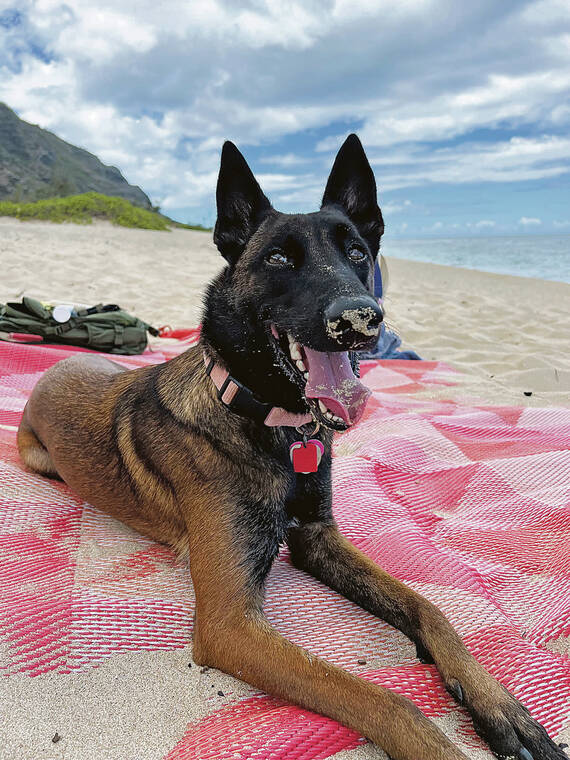Will relocating River of Life help ease homeless complaints in Chinatown?

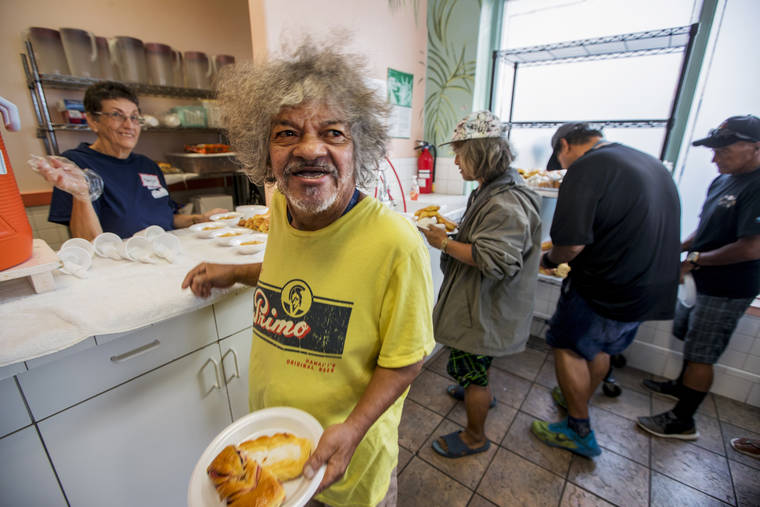
DENNIS ODA / DODA@STARADVERTISER.COM
James Pagan and others line up for breakfast at River of Life Mission. The mission is under pressure to move its feeding service to Iwilei.
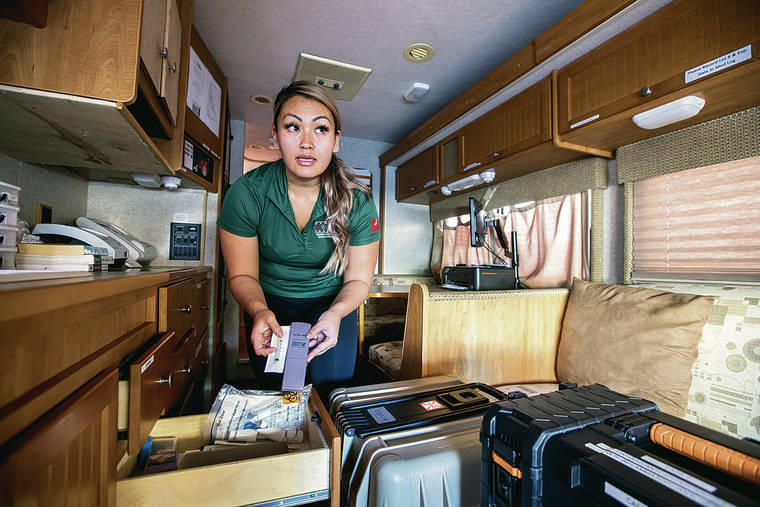
DENNIS ODA / DODA@STARADVERTISER.COM
Cadey Vakauta volunteers at the Joint Outreach Center, which has exceeded expectations in providing medical treatment to the homeless. JOC saves The Queen’s Medical Center an estimated$105,000 a week by diverting patients from Queen’s emergency room.
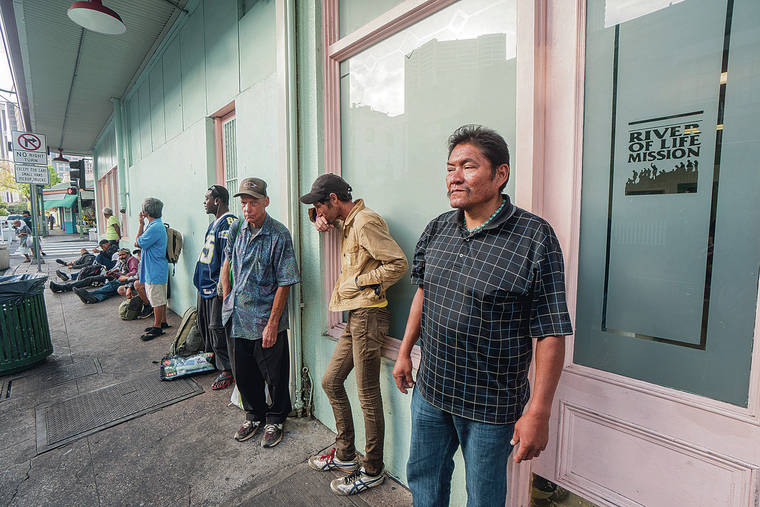
DENNIS ODA / DODA@STARADVERTISER.COM
Residents and merchants complain about the lines of people who wait outside River of Life Mission for one of its 40 seats for meal service. The mission is under pressure to move. “It’s a very open secret we’re trying to work with them to find a better location,” said Marc Alexander, director of the city’s Office of Housing.
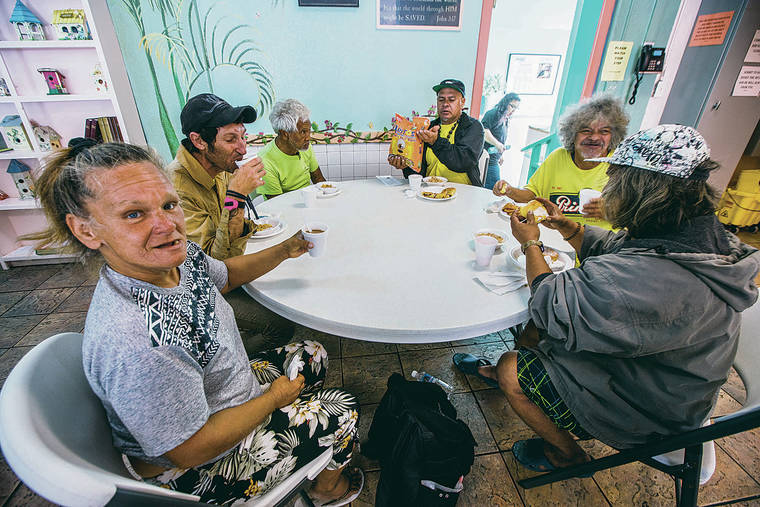
DENNIS ODA / DODA@STARADVERTISER.COM
Terre L. Almeda, left, who just wanted some coffee, dined along with Terre L. Almeda, Robert Cravens, Herman Ekau, Wendell Miguel, James Pagan and Ron Yonamine at the River of Life Mission.
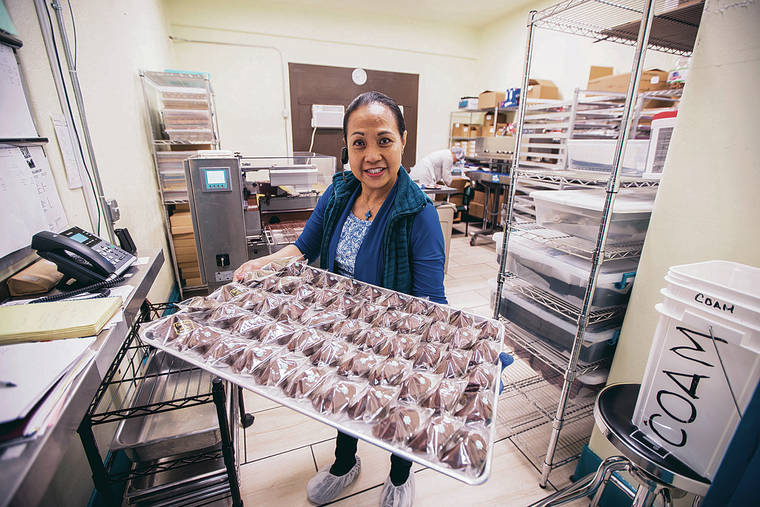
DENNIS ODA / DODA@STARADVERTISER.COM
On the third floor of the River of Life Mission is a business Chocolate on a Mission, which produces high-end chocolate products. It was set up to provide working skills for the homeless. Ana Sagadraca, head chocolatier, holds a tray of fortune cookies covered with chocolate.






LAST OF FIVE PARTS
In response to complaints about homeless activity, Chinatown could see more private security patrols, expanded homeless outreach through the new Joint Outreach Center and the loss of River of Life Mission’s homeless feeding program.
And Lt. Gov. Josh Green, a Hawaii island emergency room physician, said he believes 40 to 50 homeless people in Chinatown — along with 250 to 300 others around the state — could lead better lives after legislators this session lowered the threshold to give mentally ill people monthly injections that have the potential to help them.
>> Honolulu police and local residents team up to ‘take back’ Chinatown from homeless
>> Oahu’s homeless population falls 1%
>> Life on Oahu streets takes heavy toll
>> Chinatown business owners frustrated with homeless
Don't miss out on what's happening!
Stay in touch with breaking news, as it happens, conveniently in your email inbox. It's FREE!
>> Chinatown grapples with surge in homeless
RELATED PHOTOS
>> Homeless in Honolulu’s historic Chinatown district
Right now, Green said, some homeless people — often with mental health issues — are costing The Queen’s Medical Center $700,000 to $1 million in annual medical expenses.
One ambulance ride to Queen’s can cost $1,250, along with a physician’s bill of up to $1,700, Green said.
So Green also hopes to expand the operating hours of the year-old Joint Outreach Center, which offers free medical care three days a week in the same building as the Honolulu Police Department’s Chinatown sub-station.
Green said the JOC, as it’s called, saves The Queen’s Medical Center $105,000 a week by diverting patients from Queen’s emergency room.
The JOC has exceeded expectations since it opened in April 2018 by treating 1,486 different patients at both the JOC and the nearby Institute for Human Services.
They come to the JOC from Waikiki and as far away as Waianae and Kailua, said Andy Mounthongdy, executive director of the Hawaii Homeless Healthcare Hui “H4” that runs the Joint Outreach Center.
“We didn’t know how big the demand is,” Mounthongdy said.
The JOC also gets police officers back on the street faster after they arrest a homeless person complaining of medical problems, Mounthongdy said.
A prisoner-patient needs a medical clearance before officers can book them into the police cell block, Mounthongdy said.
“But an officer can wait a whole shift at Queen’s waiting to be cleared,” said Mounthongdy, whose time at the JOC is paid by Queen’s. “The guys in Chinatown know to bring them here.”
The clinical work at the JOC and IHS costs $20,000 a month, which comes from HMSA and Island Hospice, Mounthongdy said.
“If they want seven days a week, give me the funding,” Mounthongdy said. “It’s all about the funding.”
The JOC is comprised of a 16-by-32-foot clinical area and an adjacent 16-by-16-foot room that’s used to store hygiene kits, donated clothes and does double duty as an area for psychiatric treatment.
While volunteer doctors and University of Hawaii medical students treat homeless patients at the JOC, a dozen or so businesses have extended a 3-month-pilot program to hire private security guards from Bethel to River streets and from North Pauahi to the edge of Beretania streets.
They each pay $70 a week for private security patrols that are authorized to enforce trespassing violations for their privately owned Chinatown doorways. The patrols also report “sit-lie” violations to Honolulu police.
Hiring private security guards “was a suggestion to us from HPD,” said Lee Stack, president of the Chinatown Improvement District. “We’re trying to work with the police and the community to come up with solutions.”
After the first three months, the businesses extended the private patrols another three months until the end of May, said Stack, who also owns property in Chinatown.
“We’ve gotten very positive comments,” she said. “I can see that it’s working on my property. One owner who started out said, ‘I’m not sure it’s going to work but I’ll try.’ Now he says, ‘Keep going.’”
While the new Joint Outreach Center is receiving praise, one of Chinatown’s oldest organizations devoted to serving the homeless — River of Life Mission, founded in 1986 — is under pressure to relocate its feeding service to the old Montgomery Motors building in Iwilei, near the city’s new Punawai Rest Stop.
Chinatown residents and merchants frequently complain about the lines of homeless people and low-income residents who wait outside River of Life for one of 40 seats to open up inside for breakfast, lunch and dinner.
Residents and merchants complain about the lines of people who wait outside River of Life Mission for one of its 40 seats for meal service. The mission is under pressure to move. “It’s a very open secret we’re trying to work with them to find a better location,” said Marc Alexander, director of the city’s Office of Housing.
Unlike Chinatown, which has dozens of mom-and-pop storefronts and restaurants, Iwilei is an industrial businesses district, said Marc Alexander, director of the city’s Office of Housing.
“River of Life wants to be a good neighbor,” Alexander said. “It’s a very open secret we’re trying to work with them to find a better location.”
River of Life owns its 3-story, 12,000-square-foot building on North Pauahi Street and is in talks with the city to lease the old Montgomery Motors building, said Bob Marchant, River of Life Mission’s executive director.
If River of Life Mission relocates its feeding service to Iwilei, it would be welcomed by the nearby Institute for Human Services and by the city’s new Punawai Rest Stop.
Honolulu Star-Advertiser reporter Dan Nakaso spent three weeks in Chinatown — from the early hours to late at night — interviewing business owners, police, homeless people, residents, tourists and government officials about homelessness in the historic district.
Having IHS, Punawai Rest Stop and River of Life Mission’s feeding service within steps of one another would create a “campus” for homeless services, said IHS spokesman Kimo Carvalho.
“We really look forward to being a collaborative partner with River of Life and making this area here in Iwilei a campus for services for those who are in crisis,” Carvalho said. “We’re hoping it becomes a place where people can come in times of crisis and our services will be available to them.”
But some of River of Life Mission’s homeless clients said it’s unrealistic to think that they will stay out of Chinatown if River of Life relocates its feeding operation to Iwilei.
Wendell Miguel, 55, waited at River of Life for breakfast recently and asked, “Without River of Life, who’s going to feed the people in Chinatown — the people who live in the high rises, the seniors?”
River of Life Mission also operates a chocolate factory on the third floor called Chocolate on a Mission that provides job training for homeless clients.
If River of Life reaches an agreement with the city to relocate its feeding operation to Iwilei, Marchant said it likely would turn its Chinatown ground floor into a retail operation where it might provide job training while possibly selling Chocolate On a Mission chocolates, along with lunches of soups, salads and sandwiches.
“We don’t have to move,” Marchant said. “It’s got to be something that works for us.”
Marchant said it’s wrong to blame Chinatown’s homeless complaints on River of Life Mission — and simplistic to think homelessness will disappear if River of Life stops its feeding operation.
Marchant has learned a lot about dealing with the homeless after he reluctantly agreed to run River of Life Mission in 1999.
“I had a jaded view,” said Marchant, who is a pastor. “I didn’t have a good understanding of why people were homeless. I thought people were using the system. But I found out there’s multiple layers to the problem.”
Two decades later, Marchant said the people blaming River of Life Mission for Chinatown’s homeless situation are missing the point.
“They’re not dealing with why people are on the street in the first place,” he said.
BY THE NUMBERS
1,486
Number of different patients treated at both the Institute for Human Services in Iwilei and at the 1-year-old Joint Outreach Center on North Hotel Street
$105,000
Amount the Joint Outreach Center is saving The Queen’s Medical Center each week
15,000
Number of meals served each month at the River of Life Mission, which has been asked to relocate its food service operation to Iwilei
Sources: Joint Outreach Center, Lt. Gov. Josh Green, River of Life Mission

